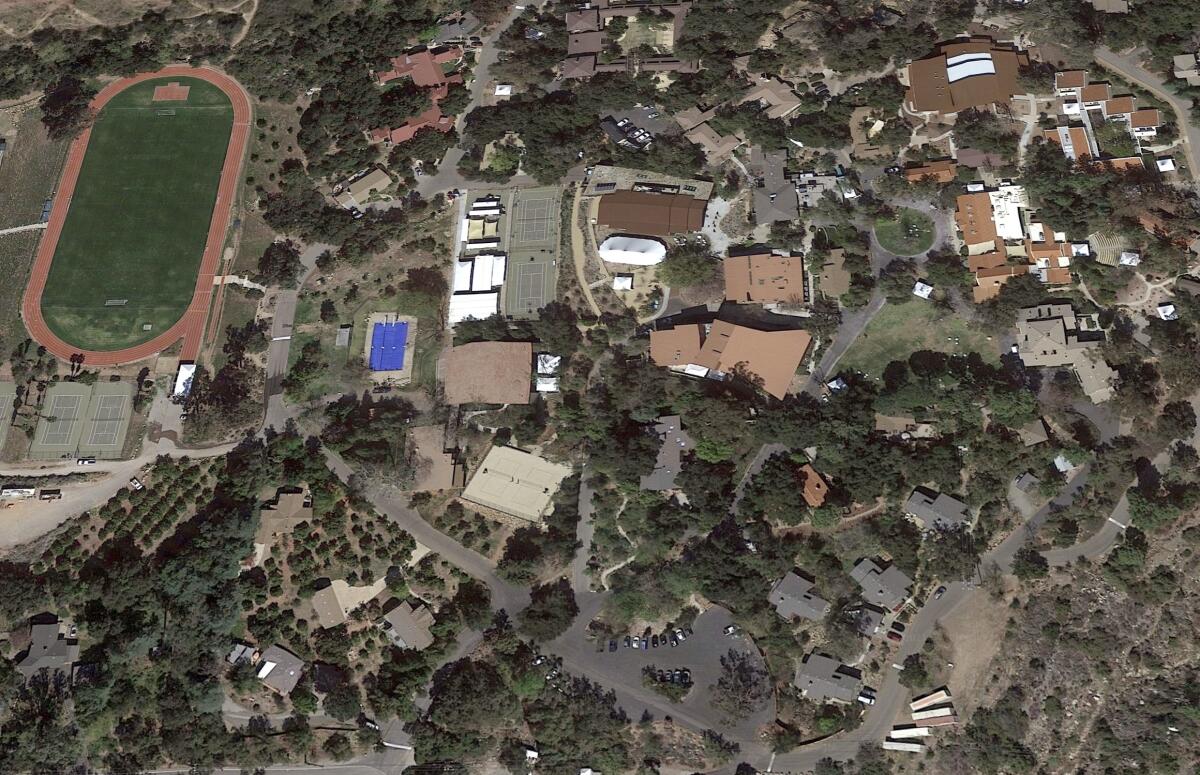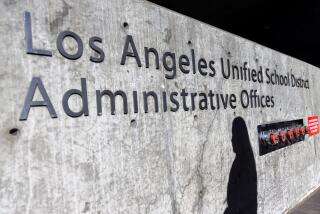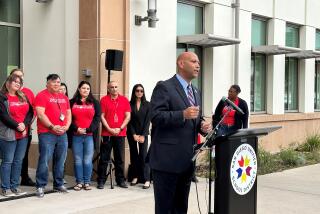Decades of allegations of sexual abuse, misconduct rock exclusive Ojai boarding school

The Thacher School, among California’s most elite private schools, acknowledged Wednesday decades of allegations of student sexual misconduct, harassment and “boundary crossing” by faculty members at the $64,700-a-year Ojai boarding academy.
In an extraordinary public disclosure, the allegations at the exclusive high school were compiled in a report posted on its website. In it, attorneys hired by Thacher laid out episodes of alleged rape, groping, unwanted touching and inappropriate comments dating back 40 years in a level of detail surprising for a private institution. The 90-page document identified six alleged perpetrators by name and recounted in lengthy passages the accusations of misconduct — and alleged efforts by former school administrators to cover up complaints and blame teenage victims.
In the most serious episode described, an alumna from the 1980s accused her English teacher of repeatedly raping her, starting when she was 16. The school did not call police, but dispatched a male assistant headmaster who reportedly asked the girl if she “enjoyed” the sex, the report said. The counselor later included her “unfortunate involvement with a faculty member” in a letter of recommendation for college.
The report was completed by the Los Angeles law firm Munger, Tolles & Olson, which the school’s trustees hired in August to conduct an investigation spurred by an alumni social media campaign that included the Instagram account @rpecultureatthacher. The account described itself as “a safe space” for those victimized at the school and led to the law firm’s inquiry, which included interviews with more than 120 former students, parents, and current and former faculty and staff.
No one accused in the report has been charged, though authorities in Ventura County told The Times they are in the process of reviewing the incidents. Last week, Thacher officials shared with the Ventura County Sheriff’s Office a synopsis of approximately 20 incidents outlining myriad alleged misconduct, according to Sgt. Hector Macias, who leads the department’s sexual assault unit. The school did not provide detectives with the 90-page report until Wednesday, the same day as its public release.
“We are going to look into them on a case-by-case basis,” Macias said of the allegations. “We are going to continue to work with the school and their law office in order to vet some of this out and see if the victims are willing to cooperate.”
Investigators were examining whether the incidents constituted crimes and whether teachers and school officials abided by their duty to notify law enforcement about suspected abuse of minors, according to Capt. Eric Buschow.
Despite the 40-year timespan, the Thacher School, whose $176-million endowment places it among the wealthiest boarding schools in the nation, could still face lawsuits from former students. A California law that took effect in 2020 opened a three-year window for victims to file civil claims that might have expired due to the statute of limitations. The law also extended the statute of limitations for reporting childhood sexual assault from the time a victim is age 26 to age 40.
Allegations in the report dated to the 1980s at the bucolic 427-acre boarding school, where academic rigor is pursued along with an outdoor ethos. With an enrollment of 259 students, the college prep program includes riding and tending to horses, camping and sports. Many faculty live on campus and are encouraged to become involved in the lives of students.
One case involved an English teacher at the boarding school. A student alleged that while feeling “lost” and homesick during her freshman year, the teacher befriended her and later kissed and touched her body without her consent. She alleged numerous instances of rape that began her sophomore year and lasted into her junior year.
Students and faculty members seemed aware and even concerned about the English teacher’s association with the girl, according to the report. Administrators likewise appeared aware: Between the girl’s freshman and sophomore years, the teacher received a performance review from the then-dean of faculty, who urged, “You need to put some distance between her and you next year.”
In the student’s junior year, she shared information with her mother, who in turn contacted the school. In the report, the student recounted being interviewed by the dean and said he pressed for details about the teacher’s sexual conduct and asked about specific sex acts and if she enjoyed it. The dean denied asking if she enjoyed it, according to the report. He could not immediately be reached for comment by The Times.
After being confronted by administrators, the teacher resigned and left campus. The report’s authors found no written evidence that anyone at Thacher ever reported the teacher to police, although the school’s college recommendation letter for the student made mention of her “unfortunate involvement with a faculty member.”
A psychologist who spoke with the student — and was not affiliated with Thacher — reported possible child abuse to the Ventura County Sheriff’s Office three weeks after the teacher resigned.
The Sheriff’s Office cleared the case, at the time noting that the “complainant refuses to participate.” The psychologist later wrote to the then-head of school, Willard “Bill” Wyman, stating that he and the school administration had convinced the student’s mother that it would be in her daughter’s “best interest not to press charges, as it would further isolate her from her peers.”
Wyman, who led the school from 1975 to 1992, was also accused of inappropriate conduct. The school hired outside lawyers in 1992 after a group of faculty and students approached a trustee with complaints. Those lawyers found the former head of school had committed “a pattern of offensive verbal conduct and improper touching” toward female students and staff and uncovered 17 incidents, including one in which Wyman asked two girls to wear “slinky” and “sexy” clothes at a dinner party at his house and placed his hand on a student’s butt.
Wyman, who has since died, stepped down in 1992, although his resignation letter did not detail the allegations against him.
The chair of Thacher’s governing board, Daniel W. Yih, wrote in a letter accompanying the report that none of the accused remained employed by the school.
“To survivors of sexual misconduct and their families in our community, we are deeply sorry,” Yih wrote, adding, “We have learned a great deal about our history over the past several months — much of which has been difficult to confront.”
In a statement, Thacher’s board of trustees acknowledged the consequences of its failure to exert proper oversight and enforce the requirements of mandatory reporting of alleged sexual abuse to law enforcement.
“The impact on students was profound. Many suffered lasting harm not just from the sexual misconduct itself but also from the school’s handling of the misconduct,” the trustees said in a statement.
The report detailed numerous instances of failings by faculty members and administrators.
One faculty member, Michael Mulligan, the dean of students in the 1980s who later succeeded Wyman as head of school, had previously worked with a teacher at a New England boarding school who had an inappropriate relationship with a female soccer player, the report said. Mulligan reported the teacher’s misconduct, and the teacher was asked to leave at the end of the school year.
But a few years later, in 1987, that same teacher was hired at Thacher as the girls’ varsity soccer coach, according to the report. Mulligan supported the hiring because he knew the man was a great coach and didn’t think he would make the same mistake at Thacher, the report said.
When a teacher later reported to Mulligan that the soccer coach was spending a lot of time alone with a student, including in the coach’s house and car, Mulligan directed that teacher to counsel the coach about it.
According to the report, Mulligan said he regretted not confronting the coach himself when the concern was raised. That same student later met with Mulligan, according to the report, and detailed an evening when the coach had invited her into his house and massaged her back and shoulders. The student’s parents said they also reached out to Mulligan, but that the coach kept his job.
Mulligan told the school’s lawyers that he didn’t remember being notified about the unwanted back massage and added that if he’d heard of any inappropriate or unwanted physical contact with a student, he would have confronted the coach and removed him from campus.
Once in college, that same student crossed paths with two others who shared their experiences with the coach, which happened after hers. The three of them decided to speak to Mulligan together in mid-June 1997. In that meeting, the report states, one of the students said Mulligan explained that the coach was “lonely and confused.”
According to the report, Mulligan confirmed the meeting but said his memory of the details differed. After hearing the allegations of one of the students who said she was groped by the coach, Mulligan said he told the coach to resign and leave campus. Mulligan said the coach’s conduct was reported to law enforcement, although he didn’t recall making the report himself. The law firm noted that it was unable to find any record of when a report was made or to what agency, and the coach went on to work at other schools.
In a June 12 letter to alumni, faculty, staff and parents, Mulligan said that during the course of the investigation, several victims of alleged sexual assault came forward to share their experiences, prompting him to apologize for his conduct.
“I particularly regret situations where certain decisions I made contributed to this suffering, and I fully accept that criticism,” he wrote. “My fervent hope is that the conclusions that the Board has reached and the corrective actions they and the current administration undertake as a result will contribute in important ways to doing ‘the best work ... that we can,’ with and for their students.”
In a statement Thursday through his attorney, Mulligan expressed “deep empathy for the victims” and hopes that the past and present school community “will learn from this report and that its lessons will inform how the school operates going forward.”
In releasing the findings, Thacher officials announced the school would take “corrective actions” to address and prevent sexual misconduct. Future recommendations on decisions and policies would include input from a task force created by the head of school.
The school said it would establish a “comprehensive protocol” for adult-on-student sexual misconduct reports that would include bringing in a third-party investigator and a response team trained in addressing such allegations; it will adopt policies to inform the school community and other institutions regarding outgoing employees; and it will “strengthen” restrictions on hiring individuals with a reported history of sexual misconduct.
It also said it would increase resources for students to report sexual misconduct and improve counseling services.
Paul Mones, a sexual abuse attorney who is representing a victim who was interviewed for the report, described the report’s findings as “unfortunately typical” of private boarding academies.
“Because these are closed environments, where the teachers live on campus by and large, and the students live there, the lines of appropriate behavior, even the grooming behaviors, are blurred,” said Mones, adding, “It seems here that the teachers there really were able to operate or run their lives with these students with complete impunity.”
More to Read
Sign up for Essential California
The most important California stories and recommendations in your inbox every morning.
You may occasionally receive promotional content from the Los Angeles Times.














